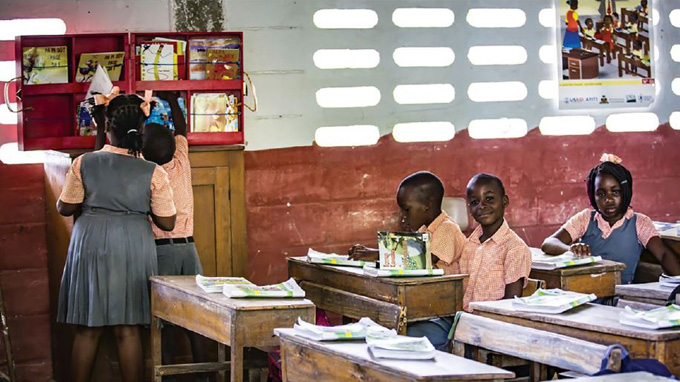
Within the world of international education, there are more than 175 million children unable to read. In Latin America alone—in countries such as Guatemala, El Salvador, Belize, Nicaragua, and Haiti—the national literacy average is below 80% countrywide. When looking specifically at Haiti, there is a 49% literacy rate, which makes it the lowest in the western hemisphere and the 12th lowest globally.
Such numbers are shocking and call for a global paradigm shift centered on access interventions that support a culture of literacy.
The issue at large
Students everywhere have an inalienable right to quality education and literacy resources, but they are being denied this right because of systemic variables that are far too great to maneuver alone.
Because of the generational and situational poverty within rural communities in Haiti, many children are subjected to toxic stressors as well as lack of available print and the foundational skills necessary to achieve academically. Yet reading is one of the core foundational skills needed for academic and economical success in modern society. Reading allows one to discover unfamiliar realms, provides exposure to vocabulary, develops positive self-image, invites creativity, and navigates the vehicle of change when one is forced to endure difficult situations.
You see, starting the academic race late can have larger critical implications for societal growth in the long run. Research has shown us that a country's success in national academic assessments, such as in reading and math, can account for more than 70% of that country's economic growth. In countries such as Haiti, with large disparities in the acquisition of reading and writing skills, this link is daunting when considering national assessment results that reveal incoming third graders' zero fluency rate in either Haitian Creole or French.
So what can be done to mitigate this harsh reality?
Children's Rights to Read
The work we do at the Alliance for Catholic Education (ACE) in Haiti program at the University of Notre Dame aims to address these issues. The ACE program strengthens underresourced schools through leadership, research, and professional service, with programs in place across the United States, as well as in Ireland, Chile, and Haiti.
In Haiti, expanding access is one of the pillars of the program, which began as a way to help rebuild schools across the country following the devastating 2010 earthquake.
Our mission is supported by the framework of ILA's recently launched Children's Rights to Read initiative. Composed of 10 fundamental rights ILA asserts every child deserves, the campaign aims to activate educators around the world to ensure every child, everywhere, receives access to the education, opportunities, and resources needed to read.
This campaign shines a poignant spotlight on the current global literacy crisis.
Among the rights
- Children have the right to access text in print and digital formats.
- Children have the right to read for pleasure.
- Children have the right to supportive reading environments with knowledgeable literacy partners.
- Children have the right to read as a springboard for other forms of communication, such as writing, speaking, and visually representing.
- Children have the right to benefit from the financial and material resources of governments, agencies, and organizations that support reading and reading instruction.
Our intervention efforts in Haiti begin with access. Children must be afforded the opportunity to reflect on life's possibilities, and they can do this through high-quality resources such as books.
There has been a series of interventions around increasing the level of access to books in countries such as Haiti. With many parents having fewer than three books in their homes and schools having minimal access to supplementary books in the classroom, the need to increase a modal response is vital.
Organizations such as Libraries Without Borders, Library For All, and World Readers, to name a few, have made a ripple effect in the basin of illiteracy in Haiti. The University of Notre Dame's ACE program has also become innovative in its approach to literacy intervention by providing classroom libraries within its supported schools.
We partner with local organizations to implement literacy interventions that deliver a scripted literacy program, teacher training, supportive coaching, quality resources, and leveled texts within the classroom. The goal is to support emergent readers, strengthen teaching pedagogy, and link community and school, all while increasing access.
Anecdotal reports from students and teachers clearly demonstrate that they welcome having access to books in their mother tongue of Haitian Creole as well as the language of instruction, French. Students find reading sessions meaningful as they can practice reading all while extending oral vocabulary in Haitian Creole and French.
Teachers participate in read-aloud sessions that provide students with the occasion to be reflective while thinking critically. The classroom libraries provide manipulatives such as phonics dominoes and vocabulary bingo. Teachers are also trained on the importance of increasing print in the classroom as well as how to set up and use Haitian Creole and French interactive word walls.
One step at a time
Though the establishment of schoolwide libraries is ideal for supplementing reading materials, it is not always a feasible option because of the financial constraints of many schools. However, it is important to remember that the battle to shift the axis of access must start small. Our efforts can be building blocks toward larger interventions.
ILA's Children's Rights to Read initiative is the constant reminder we need that education for all is possible—one building block at a time.
Anasthasie N. Liberiste-Osirus, an ILA member since 2011, is the associate director of the University of Notre Dame's Alliance for Catholic Education in Haiti program.
This article originally appeared in the March/April 2019 issue of Literacy Today, ILA’s member magazine.